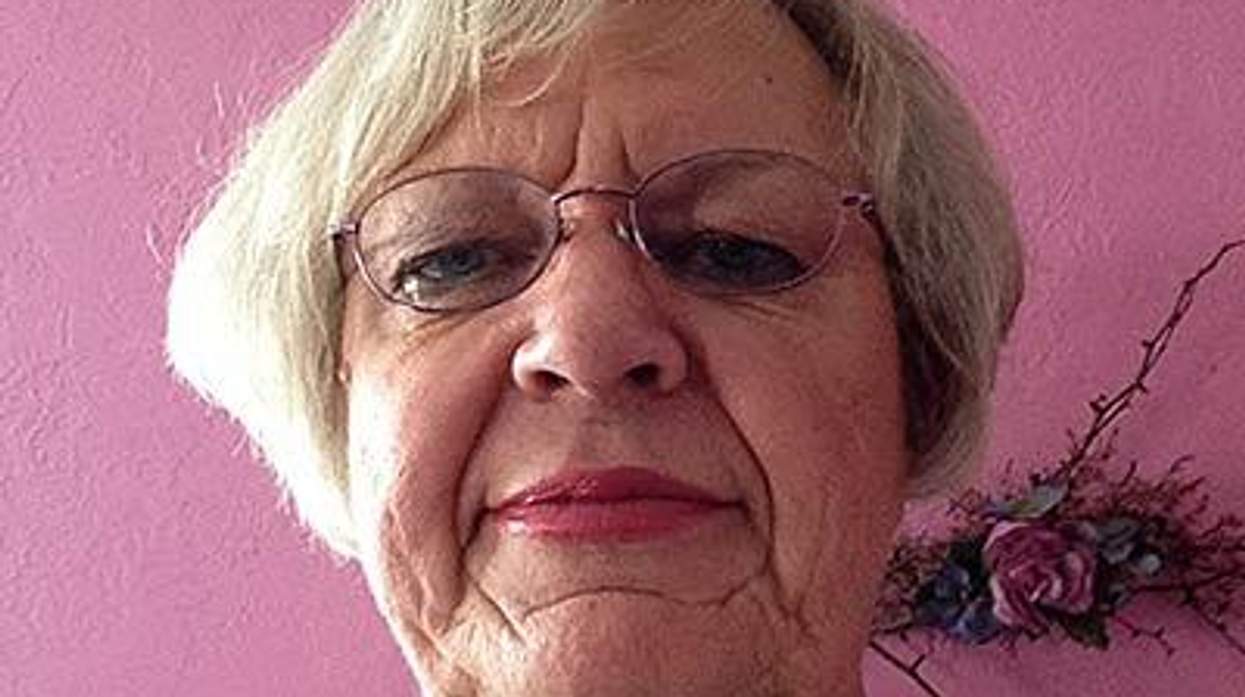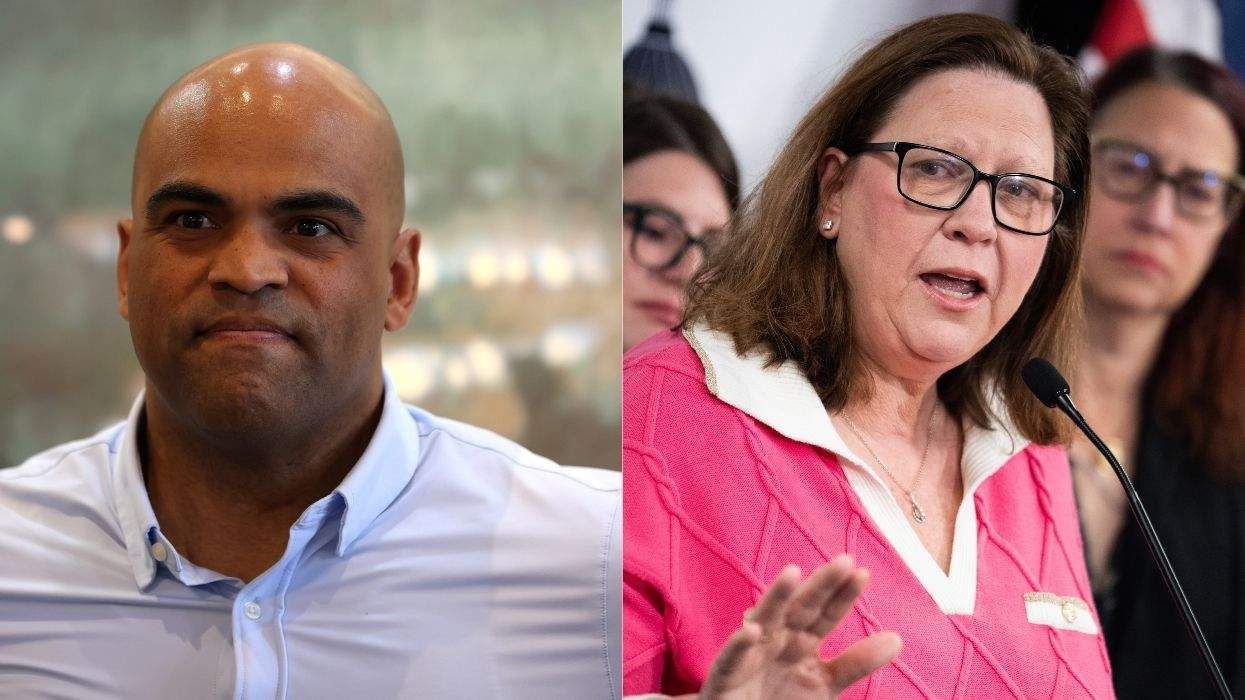A handful of transgender political candidates are competing for seats across the country, but Larissa Sneider might have the biggest challenge of all, seeking a seat as a transgender Democratic state representative in red-drenched Wyoming. This summer Sneider went to the Wyoming State Democratic Convention and attended candidate orientation so she could run to represent House District 49, which includes her town, Evanston.
Sneider was born and raised in Toledo, Ohio, and worked at Motorola in Arizona and was a salesperson in her father-in-law's electronics store in North Dakota before settling in Wyoming to work as a Walmart manager. In 2013, after 10 years of working at Walmart, Sneider retired and put her passion for politics into play. She was in Wyoming's capital city, Cheyenne, last year when she decided to visit the galleries of the capitol building and sit in on a legislative session. She didn't like what she heard.
"I was listening to someone speak who didn't want his children to learn about evolution and climate change," she said. "To sit up there and keep my mouth shut -- it hurt. I have very strong opinions and very strong arguments."
Nonetheless, in her county Republicans outnumber Democrats 4 to 1, according to some calculations. As the only Democratic candidate, she will face Republican incumbent Garry C. Piiparinen
Democratic leaders like state party chair Ana Cuprill say they are glad to have Sneider on their roster of candidates.
"I hope her constituents can see her not as a curiosity, but as a serious candidate willing to tackle the issues and give back to her community," Cuprill says. "I think her personal story will appeal to voters who are tired of traditional candidates and are ready to see some real courage and inclusion in a political campaign. Her transition and her willingness to be a candidate actually defines her as someone living the first rule of Wyoming's code of the West: Live each day with courage."
But in a red state like Wyoming, where rabid Republican and gun activist Ted Nugent recently spoke to an influential group of Tea Party members, even Sneider says she is surprised that her candidacy as an openly transgender woman hasn't stirred up more dust, nor has it attracted any mud-slinging from opponents on the right.
"I know there are some dirty looks and some of this and some of that, but people take me at face value," she says. "It's actually kind of strange. I think there are a lot of things going on behind my back that I don't hear. But I think most of the reaction has been positive."
Sneider's sentiments echo those of transgender candidates who have preceded her with big and small victories across the country. These candidates are often the people who introduce the subtle intricacies of gender to everyday voters. For example, Gypsy Vered Meltzer, 31, who was elected to the City Council of Appleton, Wis., last year, presents as both male and female. But by knocking on every door in his district, voters got to know him, and not just his gender status.
"I actually feel more validated about myself now than I ever thought I would feel," Meltzer says. "How one presents one's gender identity is so fluid and complex in our society."
Over the years, a handful of transgender politicians have run for office successfully. After winning a state Assembly seat in 2012, Stacie Laughton of Nashua, N.H., voluntarily resigned because she failed to disclose prior to the election that she had been convicted of a felony and still owed fines. She still has her eye on a possible run in 2018 after she focuses on community work to pay those fines. She, like other transgender political candidates and officeholders, says she believes the American electorate has changed its views and attitudes about transgender people in recent years, as equality in general has become a hot issue.
"Nashua has a long history of accepting people from all walks of life," Laughton says. "I found my district to be very accepting and I never got any kind of grief because I was transgender. I felt like a regular candidate like anyone else."
Meanwhile in Nevada, a Republican transgender candidate, Lauren Scott, is running for a state legislature seat in what most pundits consider a purple state. Earlier this summer, she got one step closer when she defeated Adam Khan in the Republican primary. Now she's squaring off against Democratic incumbent Michael Sprinkle for the November 4 election for Nevada's Assembly District 30 seat.
Wyoming was the first state to give women the right to vote -- in 1869 -- and was first to have a female governor, leading to one of its nicknames, the Equality State. Nearly 150 years later, the transgender tipping point may well lead to the first transgender candidate holding state office there and greater acceptance of transgender people around the country.
As the November election draws near, Sneider says she will campaign on her commitment to social justice, raising the minimum wage, and Medicaid expansion that would help Wyoming residents benefit from the Affordable Care Act. It won't be just LGBTQ issues that get her attention.
"I'm not a single-issue [candidate] in any way," she said. "Even if I don't win, I'm going to use this election as a way to educate people about gender identity and transgender people. The more people who are totally out, the better it's going to be for all of us, because it's harder to hate a person than it is an idea."
Sneider, 68, is tall and outgoing, and says she feels totally comfortable in her own skin. She tells The Advocate that after her transition, she is "100 percent open" about her transgender status in declaring her candidacy. In fact, she says very few people have even asked her about it, but if they do, she's willing to talk. But if anything, Sneider says the mere fact that her campaign can be so open has triggered a number of emotional responses in her.
"It makes me more determined to make changes in my world. It emboldens me. Not to say I was shy in the recent past," she says. "I have always been a bit of an activist. So this was just a shot in the arm, so to speak."















Charlie Kirk DID say stoning gay people was the 'perfect law' — and these other heinous quotes
These are some of his worst comments about LGBTQ+ people made by Charlie Kirk.